The 2024 NSF ENG CAREER Workshop mentors will provide expert guidance and mentorship to selected faculty participants during the invite-only Mock Panel Review Session on May 16, 2024 (Day 2) and support faculty after the workshop as they work to prepare and submit their CAREER proposals. This page will be updated continuously as more mentors are confirmed.
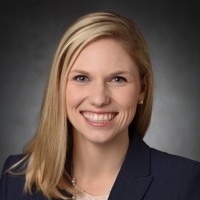
Catherine G.P. Berdanier
Associate Professor of Mechanical Engineering
Pennsylvania State University
Catherine G.P. Berdanier is an Assistant Professor of Mechanical Engineering at Pennsylvania State University and is the Director of the World Campus (online) Master of Science in Mechanical Engineering Program at Penn State. She directs the Engineering Cognitive Research Laboratory (ECRL) at Penn State in the Department of Mechanical Engineering, where her research interests include graduate-and postdoctoral-level engineering education; attrition and persistence mechanisms, metrics, policy, and amelioration; engineering writing and communication; cross-contextual design research; and methodological development for nontraditional data. Her work is funded through several NSF grants in the EEC and CMMI directorates, including RFE, IUSE, S-STEM, and CAREER. Her NSF CAREER award studies master’s-level departure from the engineering doctorate as a mechanism of attrition. Her work has been published across multiple venues in the engineering education and mechanical engineering research literature, including Journal of Engineering Education, International Journal of Engineering Education, and Journal of Mechanical Design. She is also an Associate Editor for Journal of Engineering Education. Catherine earned her B.S. in Chemistry from The University of South Dakota, her M.S. in Aeronautical and Astronautical Engineering from Purdue University, and Ph.D. in Engineering Education from Purdue University.
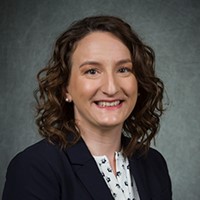 Samantha Brunhaver
Samantha Brunhaver
Associate Professor of Engineering
Arizona State University
Samantha Brunhaver is an Associate Professor of Engineering and Graduate Chair of the Engineering Education Systems & Design Ph.D. Program within The Polytechnic School of the Ira A. Fulton Schools of Engineering at Arizona State University. Her research focuses on the social and cognitive factors that influence engineering-related student persistence, career decision-making, professional practice, and workplace transitions, with a special focus on the role of mentoring and fostering engineering mindsets. She is also a mixed-methods researcher, integrating both quantitative and qualitative approaches into her research projects. Dr. Brunhaver’s work has been funded through several National Science Foundation grants in the Engineering Education and Centers directorate, including the NSF RFE and IUSE/PFE programs. She received the NSF CAREER award in 2020 to enhance the adaptability of engineering undergraduate students and early career professionals. She has also earned four American Society for Engineering Education best paper division awards and published in diverse venues such as Engineering Studies, Education + Studies, and Human Resource Development Quarterly. Dr. Brunhaver received her bachelor’s degree from Northeastern University and her master’s and doctoral degrees from Stanford University, all in mechanical engineering. She is an associate editor for the Journal of Engineering Education and Engineering Studies. She has also served a two-year term as a director of the ASEE Educational Research and Methods Division (ERM).
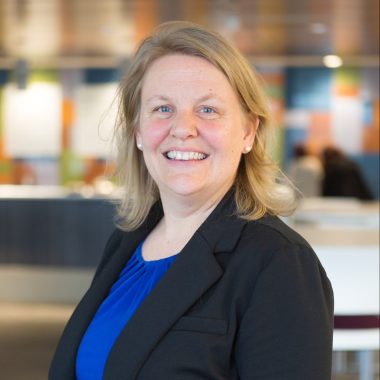 Monica Cardella
Monica Cardella
Director of the School of Universal Computing, Construction, and Engineering Education (SUCEED)
Florida International University
Monica E. Cardella is the Director of the School of Universal Computing, Construction, and Engineering Education (SUCCEED) at Florida International University. SUCCEED is home to an Interdisciplinary Engineering undergraduate program and an Engineering and Computing Education doctoral program. Her research and teaching focuses on engineering design, mathematical thinking, and computational thinking across formal and informal settings. She has investigated this through studies of practicing professionals, undergraduate students and educators, middle school students, elementary school teachers and students, and children and families. Dr. Cardella received the NSF CAREER award in 2011 and was recognized as a Fellow of the American Society of Engineering in 2020. She has co-authored over 200 journal and conference publications, was a co-editor of Engineering in Pre-College Settings: Research, Policy and Practices , and served as Editor of the Journal of Pre-College Engineering Education Research. She has a BSc in mathematics from the University of Puget Sound, and an MS and Ph.D. in industrial engineering from the University of Washington. She was a National Academy of Engineering Postdoctoral Engineering Education Researcher at Stanford University. She also served as a Program Director in the Division of Research on Learning in Formal and Informal Settings at the National Science Foundation.
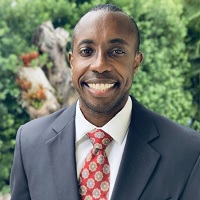 Darryl Dickerson
Darryl Dickerson
Assistant Professor of Mechanical and Materials Engineering
Florida International University
Darryl Dickerson is an assistant professor of Mechanical and Materials Engineering at Florida International University where he directs the Inclusive Complex Tissue Engineering Laboratory. His technical research focuses on transforming multiscale biomechanical and mechanobiological insights into biomanufacturing processes enabling the creation of personalized, fully functional engineered tissues with a specific focus on inclusive science and engineering. This work connects to Dr. Dickerson’s broader vision to make engineering spaces more diverse, more equitable, and more inclusive which includes education research focused on faculty-driven institutional transformation. He has served as the Chief Executive and Chair of the Board of Directors of the National Society of Black Engineers, expanding the strategic focus of NSBE’s Pre-College Initiative by founding the Summer Engineering Experience for Kids (SEEK), which has served more than 30,000 students since its inception. After completing his PhD, Dr. Dickerson founded Advanced Regenerative Technologies to translate his academic benchtop work to clinical practice, leading to the introduction of BioEnthesis, a rotator cuff tendon enthesis repair product, currently in clinical use.
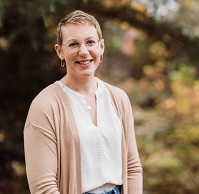 Courtney Faber
Courtney Faber
Assistant Professor of Engineering Education
University of Buffalo
Courtney Faber, Ph.D., is an Assistant Professor of Engineering Education at the University at Buffalo (UB). Prior to joining UB in August of 2023, she was a Research Associate Professor and Senior Lecture in Engineering Fundamentals at the University of Tennessee, Knoxville. She was also the Director of the Fundamentals of Engineering and Computing Teaching in Higher Education Certificate Program. Her research focuses on empowering engineering education scholars to be more effective at impacting transformational change in engineering and developing educational experiences that consider epistemic thinking. She develops and uses innovative research methods that allow for deep investigations of constructs such as epistemic thinking, identity, and agency. Dr. Faber has a B.S. in Bioengineering and a Ph.D. in Engineering and Science Education from Clemson University and a M.S. in Biomedical Engineering from Cornell University. Among other awards for her research, she was awarded a National Science Foundation CAREER Award in 2022 to study epistemic negotiations on interdisciplinary engineering education research teams.
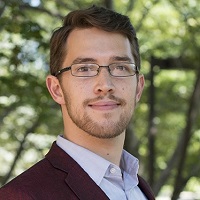 Mark Fuge
Mark Fuge
Associate Professor of Mechanical Engineering
University of Maryland, College Park
Mark Fuge is an Associate Professor of Mechanical Engineering at the University of Maryland, College Park, where he is also an affiliate faculty in the Institute for Systems Research and a member of the Maryland Robotics Center. His staff and students study fundamental scientific and mathematical questions behind how humans and computers can work together to design better complex engineered systems, from the molecular scale all the way to systems as large as aircraft and ships using tools from Computer Science (such as machine learning, artificial intelligence, and submodular optimization) and Applied Mathematics. He received his Ph.D. from UC Berkeley (2014) and his BS. and M.S. at Carnegie Mellon University (2009). He has received an NSF CAREER Award, a DARPA Young Faculty Award, and a National Defense Science and Engineering Graduate (NDSEG) Fellowship. For his teaching, he was awarded the E. Robert Kent Outstanding Teaching Award for Junior Faculty and a UMD Academy for Innovation and Entrepreneurship Faculty Fellowship. He has served as the Chair of the ASME Design Theory and Methodology Technical Committee, and currently is an Associate Editor for the Journal of Mechanical Design and for Computer-Aided Design. In July, he will be joining ETH Zürich as Full Professor and Chair of Artificial Intelligence in Engineering Design in the Department of Mechanical and Process Engineering.
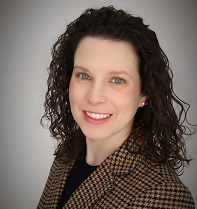 Allison Godwin
Allison Godwin
Professor of Chemical and Biomolecular Engineering
Cornell University
Allison Godwin, Ph.D., is the Dr. G. Stephen Irwin ’67, ’68 Professor of Engineering Education Research in the Robert Frederick Smith School of Chemical and Biomolecular Engineering at Cornell University. Her research focuses on how identity, among other affective factors, influences diverse groups of students to choose engineering and persist in engineering. She also studies how different experiences within the practice and culture of engineering foster or hinder belonging and identity development. Prof. Godwin graduated from Clemson University with a B.S. in Chemical Engineering and Ph.D. in Engineering and Science Education. Her research earned her a 2016 National Science Foundation CAREER Award (1554057). She also collaborated on an NSF EAGER (1837808/1837805) focused on what makes successful NSF CAREER proposals and has developed a framework and tools for proposal preparation. She is an associate editor for the Journal of Engineering Education and Chemical Engineering Education.
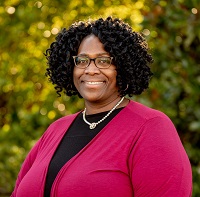 Cheryl T. Gomillion
Cheryl T. Gomillion
Associate Professor in the School of Chemical, Materials, & Biomedical Engineering
University of Georgia
Dr. Cheryl Gomillion is an Associate Professor in the School of Chemical, Materials, & Biomedical Engineering, part of the College of Engineering at the University of Georgia (UGA). She received her Ph.D. in Bioengineering from Clemson University in 2010 and completed postdoctoral training at University of Connecticut Health Center in Reconstructive Sciences and Yale University School of Medicine in Plastic and Reconstructive Surgery before joining the faculty at UGA in 2015. Her long-standing research interests are in tissue engineering and regenerative medicine. Specifically, the work of her research group focuses on three general areas: (1) design and evaluation of biomaterials for therapeutic purposes; (2) application of materials for engineering tissue systems; and (3) advanced engineering strategies for developing in vitro models and culture systems. Central to these areas is a burgeoning area of research within her group focused on the integration of biomedical and engineering education research with a specific focus on evaluating classroom innovations for improving biomedical engineering student learning and exploring factors that facilitate success for diverse students. Dr. Gomillion was awarded an NSF CAREER Award in 2022 to support her research, education, and outreach efforts for her grant entitled CAREER: In Vitro Model Approaches Leveraging Quantitative Cancer Cell Properties as Determinants of Metastatic Potential.
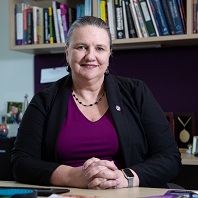
Michele J. Grimm
Professor and Dean of the College of Nanotechnology, Science, and Engineering
State University of New York at Albany
Michele J. Grimm is Professor and Dean of the College of Nanotechnology, Science, and Engineering at the University at Albany, part of the SUNY system. She moved to Albany in 2022 after a 25-year career at Wayne State University, followed by 3 years at Michigan State University as the Wielenga Creative Engineering Endowed Professor of Mechanical Engineering and Biomedical Engineering. Dr. Grimm completed her BS in Biomedical Engineering and Engineering Mechanics at the Johns Hopkins University in 1990 and her PhD in Bioengineering at the University of Pennsylvania in 1994. Her research interests span injury biomechanics to engineering education. In August of 2019, she finished a 3-year rotation as a program director for three BME programs at the National Science Foundation (EBMS, DARE, and BMMB). During this time, she served as co-chair of the White House’s Office of Science and Technology Task Force on Research and Development for Technology to Support Aging Adults. From 2019 through 2023, she served on the National Academy of Medicine’s Commission on a Global Roadmap for Healthy Longevity. She is a Fellow of the American Society of Mechanical Engineers (ASME), the Biomedical Engineering Society (BMES), and the American Institute of Medical and Biomedical Engineering (AIMBE).
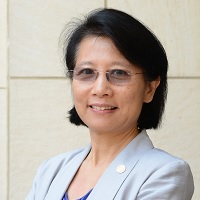 Ruyan Guo
Ruyan Guo
Robert E. Clarke Endowed Professor of Electrical and Computer Engineering
University of Texas at San Antonio
Ruyan Guo is Robert E. Clarke Endowed Professor in the Department of Electrical and Computer Engineering and Director of Interdisciplinary Graduate Program in Advanced Materials Engineering of the Klesse College of Engineering and Integrated Design at the University of Texas at San Antonio. She conducts cutting edge research and publishes broadly in interdisciplinary areas of electronic and optoelectronic materials and tunable devices for sensor, actuator, and biomedical applications. She organized a number of international scientific meetings and conferences in optoelectronics and electroceramics areas and serves on the editorial boards of the international journal on Ferroelectrics and Electroceramics. She has experience in chairing academic department, developing interdisciplinary academic programs at both undergraduate and graduate levels, and mentoring graduate students and faculty in career successes at both R1 and minority serving institutes. Guo served as an NSF Program Director in the Division of Electrical, Communications and Cyber Systems (ECCS) of Engineering Directorate at the National Science Foundation in recent years. She has been recognized as a Society Fellow of IEEE, The American Ceramics Society (ACerS), The International Society for Optics and Photonics (SPIE), and an Academician of the World Academy of Ceramics (WAC).
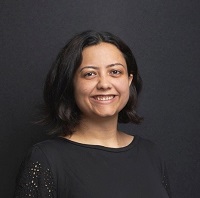 Avneet Hira
Avneet Hira
Assistant Professor in the Human-Centered Engineering Program
Boston College
Avneet Hira is an Assistant Professor and founding faculty member in the Human-Centered Engineering Program at Boston College. Her research, which is in engineering education, focuses on the affordances of technology, humanistic design, and engineering epistemology. Her work is inspired by Making and tinkering practices, especially those from different local knowledge systems. Her work is supported by funding from the NSF Directorates of STEM Education and Engineering, and private foundations. She received an NSF CAREER award in 2023 for her work on promoting belonging and preventing harm in informal engineering learning environments.
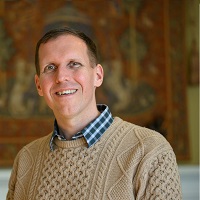 James Huff
James Huff
Associate Professor of Engineering Education and Honors College Senior Faculty Fellow
Harding University
Dr. James Huff is an Associate Professor of Engineering Education and Honors College Senior Faculty Fellow at Harding University. He conducts transdisciplinary research on identity that lies at the nexus of social and personality psychology and engineering education. Dr. Huff received the NSF CAREER award (No. 2045392) to advance research on professional shame as a pernicious force that powerfully affects individual well-being and cultural equity in domains of engineering education and practice. Director of the Beyond Professional Identity (BPI) lab, Dr. Huff has mentored numerous undergraduate students, doctoral students, and faculty from more than 10 academic disciplines in using interpretative phenomenological analysis (IPA) as a qualitative research method to examine identity in a wide variety of contexts.
 Aditya Johri
Aditya Johri
Professor of Information Sciences & Technology and Director of Technocritical Research in AI, Learning & Society Lab (trailsLAB)
George Mason University
Aditya Johri is Professor of Information Sciences & Technology and Director of Technocritical Research in AI, Learning & Society Lab (trailsLAB) at the College of Engineering and Computing at George Mason University, USA. He studies how technology shapes learning across formal and informal settings and the ethical implications of using technology. He publishes broadly in the fields of engineering and computing education, and educational technology. His research has been recognized with several best paper awards and his co-edited volume, the Cambridge Handbook of Engineering Education Research (CHEER), received the 2015 Best Book Publication Award from Division I of AERA. Most recently he served as a Fulbright-Nokia Distinguished Chair in ICT at Aalto University, Finland (2021). He is a past recipient of the NSF Early Career Award (2009) and received the University Teaching Excellence Award (2002) and Mentoring Excellence Award (2022) for undergraduate research at George Mason University. His edited volume International Handbook of Engineering Education Research (IHEER) was published by Routledge in 2023. He was awarded a Ph.D. in Learning Sciences & Technology Design (2007) from Stanford University, Palo Alto, CA. More information is available at: http://mason.gmu.edu/~johri
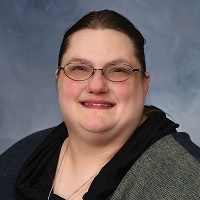 Jennifer Karlin
Jennifer Karlin
Professor of Integrated Engineering
Minnesota State University, Mankato
Dr. Jennifer Karlin is a professor of integrated engineering at Minnesota State University, Mankato, in the Iron Range Engineering program. She joined IRE as one of the founding faculty for the Bell model. Prior to that, she was a professor of industrial engineering at South Dakota School of Mines and Technology, where she held the Pietz Professorship for entrepreneurship and economic development. While there, she served a five-year term as the Coordinator of Faculty Development for the university. In her research, Jen studies colleges and universities as organizations and how adjustments in organizational artifacts and infrastructure can create positive change. She works across all levels of an organization, including learning spaces, policies and procedures, governance, and interactions across the ecosystem. Jen’s work is rooted in the core areas of economic development, organizational excellence (including change management), and holistic learner development. She has also combined these areas to develop systems for change in, and evaluate organizational health of, universities as organizations. This combination resulted in a National Science Foundation CAREER award. Her work has been funded by the National Science Foundation, the United States Air Force (through a congressional earmark), and the Material Handling Industry of America (MHIA).
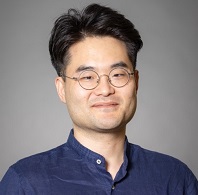 Albert Kim
Albert Kim
Assistant Professor of Medical Engineering
University of South Florida
Albert Kim is currently an Assistant Professor of Medical Engineering at the University of South Florida. He earned a B.S., M.S., and Ph.D. in Electrical and Computer Engineering from Purdue University in 2008, 2011, and 2015. From 2015 to 2017, he joined Intel Corp. as an R&D engineer. Prior to his current position, he was an Assistant Professor of the Electrical and Computer Engineering department at Temple University (2017-2022). His research interests are in transformative engineering toward medical applications, including Nano/Micro Electromechanical Systems (N/MEMS), microsystems, mobile health (mHealth), and biomimetic sensors and actuators. As a faculty member, Dr. A. Kim received the most prestigious award, NSF CAREER Award, in 2022. He is also a full member of Sigma Xi.
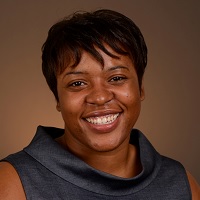 Jeremi London
Jeremi London
Assistant Provost for Academic Opportunities & Belonging
Associate Professor of Practice, Mechanical Engineering
Vanderbilt University
Dr. Jeremi London is the inaugural Assistant Provost for Academic Opportunities & Belonging at Vanderbilt University. London’s commitment to bridging the gap between research and practice in engineering education is the focus of her scholarship. Her scholarly interests have been supported by over $7.9M and resulted in over 100 peer-reviewed articles, best paper awards, and keynote addresses. London’s NSF CAREER award entitled “Disrupting the Status Quo Regarding Who Gets to be an Engineer”, blends her interests in studying paths to transformative impact in the context of broadening participation of underrepresented minorities in engineering. Moreover, London’s scholarly approach to teaching courses like mixed methods designs, statistics, and use-inspired design has also led to meaningful student outcomes and receipt of the 2017 Poly Faculty Teaching Excellence Award, the 2021 Virginia Tech Presidential Principles of Community Award, and the 2021 Dean’s Award for Excellence for Outstanding New Assistant Professors. London holds B.S. and M.S. degrees in Industrial Engineering, and Ph.D. in Engineering Education, all from Purdue University.
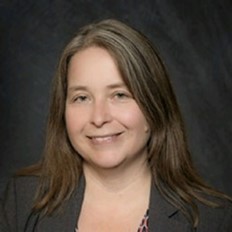 Angela D. Lueking
Angela D. Lueking
Vice Chancellor for Research & Dean of the Graduate School
Montana Technological University
Angela D. Lueking, Ph.D., Vice Chancellor of Research & Dean of the Graduate School: As Chief Research Officer at Montana Tech, Angela spear-heads new initiatives focused on materials and environmental remediation and invests in growth of convergent PhD programs at a primarily undergraduate institution. She oversees research awards, compliance, technology transfer, and graduate education. Angela rose through the academic ranks at Penn State University, with joint appointments in energy and chemical engineering. Her research in development, advanced characterization, and modeling of hydrogen storage materials, culminated in an International Marie Curie Fellowship and selection as a Program Director for the Separations program at the National Science Foundation. Angela also served as Associate Dean for Research at Missouri University of Science & Technology, where she mentored faculty and built interdisciplinary teams. She co-authored a textbook related to Energy and the Environment. Angela holds degrees from the University of Nebraska (BS) and the University of Michigan (MS and PhD) in environmental engineering and chemical engineering.
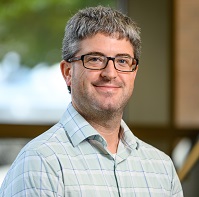 Adam Melvin
Adam Melvin
Associate Professor of Chemical and Biomolecular Engineering
Clemson University
Adam Melvin obtained a BS in Chemical Engineering and a BA in Chemistry from the University of Arizona, a MS in Chemical Engineering (with a minor in Biotechnology) and a Ph.D. in Chemical Engineering from North Carolina State University. He was an NIH postdoctoral fellow at the University of North Carolina at Chapel Hill in the Departments of Chemistry and Biomedical Engineering. He was a faculty member in the Cain Department of Chemical Engineering at Louisiana State University from 2013-2023. In August 2023, he joined the faculty in the Department of Chemical and Biomolecular Engineering at Clemson University. His research interests focus on biochemical/biomedical engineering including the design of peptide-based biosensors and therapeutics and the development of novel microfluidic platforms to model the breast tumor microenvironment and metastatic cascade as well as performing high-throughput single cell analysis. He also has interests in engineering education research and previously served as the co-director of an NSF-funded REU site in addition to launching several outreach programs for K-12 students.
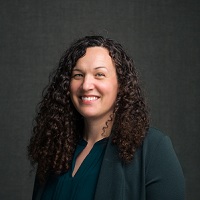 Kristin S. Miller
Kristin S. Miller
Associate Professor of Bioengineering and Mechanical Engineering
University of Texas at Dallas
Adjunct Associate Professor of Obstetrics and Gynecology
University of Texas Southwestern Medical Center
Dr. Kristin S. Miller is an Associate Professor of Bioengineering and Mechanical Engineering at the University of Texas at Dallas and an Adjunct Associate Professor of Obstetrics and Gynecology at the University of Texas Southwestern Medical Center. Dr. Miller’s research interests are focused on the mechanobiology of soft tissues, including evaluating the role of elastic fibers and contractility in the female reproductive system. Dr. Miller conducted postdoctoral research at Yale University and received her PhD in Bioengineering at the University of Pennsylvania. In 2014, Kristin joined the Department of Biomedical Engineering at Tulane University as an Assistant Professor and later received tenure and was promoted to an Associate Professor in 2020. Kristin was awarded the NSF CAREER award to develop a biomechanical model that can predict how elastic fibers in the soft tissues of the female reproductive system changes in response to mechanical pressure. In 2021, Kristin was awarded the YC Fung Early Career Award from the American Society of Mechanical Engineers. In 2022, Kristin joined the faculty at the University of Texas at Dallas and UTSW.
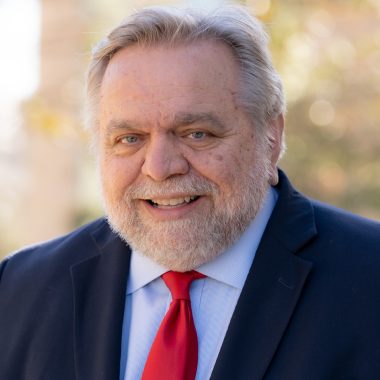 T.J. (Lakis) Mountziaris
T.J. (Lakis) Mountziaris
Professor of Chemical and Biomolecular Engineering
University of Houston
T.J. Mountziaris earned a Diploma from the Aristotle University of Thessaloniki, Greece, and a PhD from Princeton University, both in Chemical Engineering. After completing postdoctoral studies at the University of Minnesota, he joined the Department of Chemical Engineering at the University at Buffalo (SUNY) where he was a member of the faculty from 1989 to 2005. From 2003 to 2005 he served as rotating NSF Program Director for Particulate and Multiphase Processes. From 2005 to 2020 he was Professor of Chemical Engineering at the University of Massachusetts-Amherst, where, as Head of Chemical Engineering, he led his Department into a period of growth by substantially increasing the size and diversity of the faculty and student bodies. From 2015 to 2019 he served as rotating NSF Program Director for Process Systems, Reaction Engineering, and Molecular Thermodynamics. He joined the University of Houston in 2021 as the inaugural William A. Brookshire Professor and Chair of Chemical & Biomolecular Engineering. His research interests focus on reaction engineering, synthesis of nanoscale materials, biosensors, and sustainable energy. He is a Fellow of AIChE and AAAS, a senior member of the National Academy of Inventors, and recipient of the AIChE Shell Thomas Baron Award in Fluid-Particle Systems.
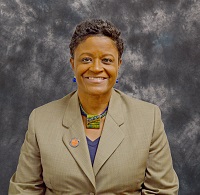 Denise Simmons
Denise Simmons
Associate Dean for Workforce Development
Associate Professor of Civil and Coastal Engineering
University of Florida
Denise R. Simmons, Ph.D., PE, PMP, LEED-AP, is an associate dean of workforce development and associate professor in the Department of Civil and Coastal Engineering in the Herbert Wertheim College of Engineering at the University of Florida. She holds a B.S., M.S., and Ph.D. in civil engineering and a graduate certificate in engineering education – all from Clemson University. She has over ten years of construction and civil engineering experience working for energy companies and as a project management consultant. Dr. Simmons has extensive experience leading and conducting multi-institutional, workforce-related research and outreach. She is a leader in research investigating the competencies civil engineering professionals need to compete in and sustain the construction workforce. She oversees the Simmons Research Lab (SRL). As a researcher, Dr. Simmons passionately pursues workforce research characterizing, expanding, sustaining, measuring and training the technical and professional civil engineering workforce in the US. The broader impact of this work lies in achieving and sustaining safe, productive, and inclusive project organizations composed of engaged, competent and diverse people. SRL is supported by four basic research grants, including a CAREER award, and one applied research grant — all funded by the National Science Foundation (NSF) and totaling over $2 million. Dr. Simmons is a former project director of the National Summer Transportation Institute at South Carolina State University and Savannah River Environmental Sciences Field Station (SRESFS). Both programs were aimed at recruiting, retaining and training women and minorities in transportation, environmental science, and engineering and natural resources-related fields of study. As SRESFS director, she led a board composed of representatives from 29 colleges and universities and three federal agencies.
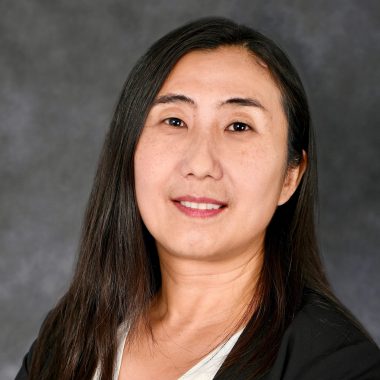 Ying Sun
Ying Sun
Professor of Mechanical and Materials Engineering
University of Cincinatti
Dr. Ying Sun is currently Herman Schneider Professor and Head of the Department of Mechanical and Materials Engineering at the University of Cincinnati. Prior to joining UC, she was Hess Family Endowed Chair Professor in Mechanical Engineering at Drexel University. In 2019-2022, Dr. Sun served as Program Director of the Thermal Transport Processes Program at the National Science Foundation. Dr. Sun is an ASME Fellow and a recipient of the NSF CAREER Award. She serves as an Associate Editor for Journal of Electrochemical Energy Conversion and Storage, and was an Executive Leadership in Academic Technology and Engineering (ELATE) Fellow. Dr. Sun directs the Complex Fluids & Multiphase Transport Laboratory that focuses on advancing fundamental thermal-fluid, interfacial, and data sciences, and applying them to enable efficient energy conversion and storage systems, sustainable manufacturing, and effective thermal management solutions.
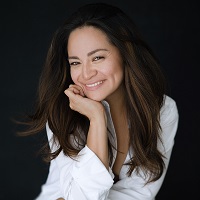 Daniela Valdez-Jasso
Daniela Valdez-Jasso
Associate Professor of Bioengineering
University of California San Diego
Daniela Valdez-Jasso is an Associate Professor of Bioengineering at the University of California San Diego, where she teaches tissue biomechanics and mathematical modeling for bioengineers. She is an applied mathematician and physiologist studying the changes in the hemodynamic, mechanical, and structural properties of the pulmonary arterial vasculature and right ventricle during the progression of pulmonary arterial hypertension and the cellular mechanisms mediating extracellular remodeling in these tissues. She studies cardiac and vascular pathophysiology, soft-tissue biomechanics and mechanobiology in pulmonary arterial hypertension using her expertise in parameter estimation and optimization, uncertainty quantification, physiological systems modeling, multiscale modeling, animal models and in-vivo physiological monitoring. Her work is currently funded through the National Science Foundation CAREER: Mechanical and Structural Adaptations of Blood Vessels in Pulmonary Arterial Hypertension, the National Heart, Lung, and Blood Institute (R01) Multiscale Modeling of Right Ventricular Fibrotic Remodeling in Pulmonary Arterial Hypertension, and the Wu Tsai Foundation – Human Performance Alliance. Her contributions to promoting inclusion and diversity in STEM education, her outreach work with numerous campus outreach programs and student organizations were recognized with the UC San Diego Faculty Inclusive Excellence Award in 2020, and with the Institute of Engineering in Medicine GEMINI Faculty Mentor award in 2022. Her diversity outreach initiatives are now supported in part by my NSF CAREER award. Dr. Valdez-Jasso currently serves as a standing member of the Modeling and Analysis of Biological Systems (MABS) Study Session, Center for Scientific Review at the National Institutes of Health. She is the inaugural holder of the Richard Skalak Chancellor’s Endowed Faculty Fellowship in Biomedical Engineering.
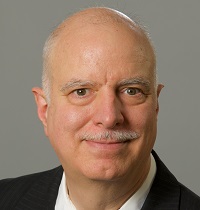 Donald Wunsch
Donald Wunsch
Mary Finley Professor
Director, Kummer Institute Center for AI & Autonomous Systems
Missouri S&T
Donald C. Wunsch II is the Mary Finley Missouri Distinguished Professor and Director, Kummer Institute Center for Artificial Intelligence and Autonomous Systems at Missouri University of Science and Technology (Missouri S&T). He is also Director of the Applied Computational Intelligence Laboratory. Earlier employers were: Texas Tech University, Boeing, Rockwell International and International Laser Systems. His education includes: Ph.D., Electrical Engineering – University of Washington (Seattle), Executive MBA – Washington University in St. Louis, M.S., Applied Mathematics – University of Washington (Seattle), B.S., Applied Mathematics – University of New Mexico (Albuquerque), and Jesuit Core Honors Program, Seattle University. He also completed the Kellogg Executive Scholar graduate certificate program in Nonprofit Management at Northwestern University. Key research contributions are real-time design of Unsupervised and Reinforcement Learning and their applications. He is an IEEE Fellow and previous International Neural Networks Society (INNS) President, INNS Fellow, NSF CAREER Awardee, and recipient of the 2015 INNS Gabor Award, 2019 INNS Ada Lovelace Service Award, and 2023 IEEE Neural Networks Pioneer Award. He served as IJCNN General Chair, and on several Boards, including the St. Patrick’s School Board, Missouri S&T Newman Center Board, IEEE Neural Networks Council, INNS, and the University of Missouri Bioinformatics Consortium, chaired the Missouri S&T Information Technology and Computing Committee as well as the Student Design and Experiential Learning Center Board. He served as Interim Director of the Missouri S&T Intelligent Systems Center and as a Program Director at the National Science Foundation. He has produced 23 Ph.D. recipients in Computer Engineering, Electrical Engineering, Systems Engineering and Computer Science.

